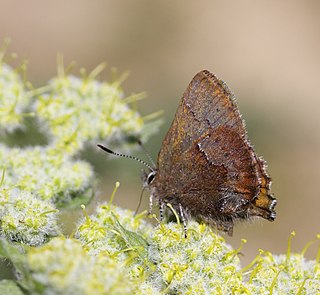
The San Bruno elfin is a U.S. federally listed endangered subspecies that inhabits rocky outcrops and cliffs in coastal scrub on the San Francisco Peninsula. It is endemic to this habitat in California. Its patchy distribution reflects that of its host plant, broadleaf stonecrop.
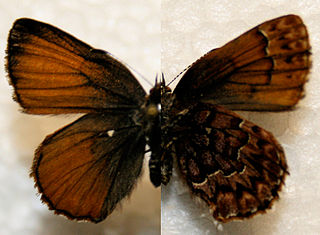
The western pine elfin is a North American butterfly that ranges from British Columbia east to Maine and south to southern California, Arizona, and New Mexico. Males are brown and females are orange-brown, with both having bold patterned hind wings. The top of the wings have dark bars with a lighter chevron shaped margin. The body is 19–32 mm in length and has no tail.

The genus Callophrys consists of butterflies in the family Lycaenidae. It is apparently not monophyletic, but which of the taxa currently considered junior synonyms of Callophrys are valid genera remains to be determined.
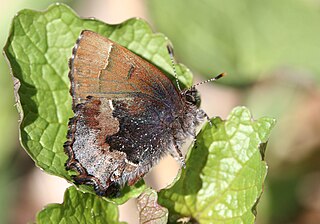
Callophrys henrici, the Henry's elfin or woodland elfin, is a North American butterfly in the family Lycaenidae. In Canada it is found from southern Manitoba to southern Nova Scotia. It has two main groups of populations in the United States; the first is found along the Atlantic Coast and uses various hollies (Ilex) as host plants; and the second is found mainly in the north and the Appalachians where they use redbud as a host plant. Henry's elfin is increasing in New England because of an introduced buckthorn it now uses as a host plant. It is listed as a species of special concern in the US state of Connecticut.

Callophrys irus, the frosted elfin, is a species of Lycaenidae that is native to North America.

Callophrys sheridanii, the Sheridan's hairstreak and Sheridan's green hairstreak, is a butterfly in the family Lycaenidae. It is found in North America along the south coast of British Columbia and parts of Nevada, Arizona, Saskatchewan, North Dakota, and New Mexico. In 2009, this species was adopted as the U.S. state butterfly for Wyoming.
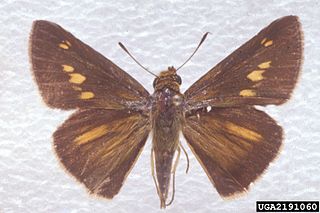
Euphyes dion, the Dion skipper or Alabama skipper, is a species of butterfly of the family Hesperiidae. It is found in scattered populations along the Atlantic coast of North America, from western Massachusetts and south-eastern New York south to north-eastern Florida, west to north-eastern Texas, and north to south-eastern North Dakota, northern Wisconsin, southern Ontario and southern Quebec. It is listed as a species of special concern in the US state of Connecticut.
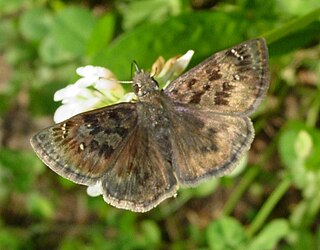
Erynnis martialis, commonly known as the mottled duskywing, is a species of butterfly in the family Hesperiidae. It is found in most of the eastern United States and in southern Ontario, and southeastern Manitoba. It is listed as a species of special concern and believed extirpated in the US state of Connecticut.

Callophrys augustinus, the brown elfin, is a species of butterfly of the family Lycaenidae, found from Alaska to northern Mexico. One of its subspecies, C. augustinus iroides, is known as the western elfin.

Callophrys mossii, commonly known as Moss's elfin, stonecrop elfin or Schryver's elfin, is a species of butterfly native to North America in the family Lycaenidae. It is found from British Columbia south to southern California and east to Wyoming and Colorado in isolated populations. The habitat consists of rocky outcrops, woody canyons and cliffs.
Callophrys fotis is a species of butterfly in the family Lycaenidae, the gossamer-winged butterflies. It is known by several common names, including early elfin, desert elfin, Fotis hairstreak, Strecker's elfin, and Arizona gray elfin. It is native to the southwestern United States, where it occurs in southeastern California, Nevada, Utah, western Colorado, northern Arizona, and northwestern New Mexico.

Callophrys spinetorum, the thicket hairstreak, is a butterfly of the family Lycaenidae. It was described by William Chapman Hewitson in 1867. It is found in North America from British Columbia through the Rocky Mountains to New Mexico and Mexico and through California to Baja California. The habitat consists of pinyon-juniper forests, mixed woodlands, and coniferous forests.
Callophrys hesseli, or Hessel's hairstreak, is a butterfly of the family Lycaenidae. It ranges from southern Maine south along the Atlantic coastal plain to northern Florida on the Gulf Coast. The species was first described by George W. Rawson and J. Benjamin Ziegler in 1950, in honor of the lepidopterist Sidney Adolphus Hessel. It is listed as endangered in Connecticut by state authorities.

Callophrys nelsoni, or Nelson's hairstreak, is a species of butterfly belonging to the genus Callophrys, wingspan of approximately 1 to 1.5 inches. Like many members of the Lycaenidae family, this butterfly has distinctive rod-like antennae. Callophrys nelsoni are gernually found throughout the west coast of the United States. Although they can be found along the very bottom of Canada's British Columbia and down to Baja California Norte.











